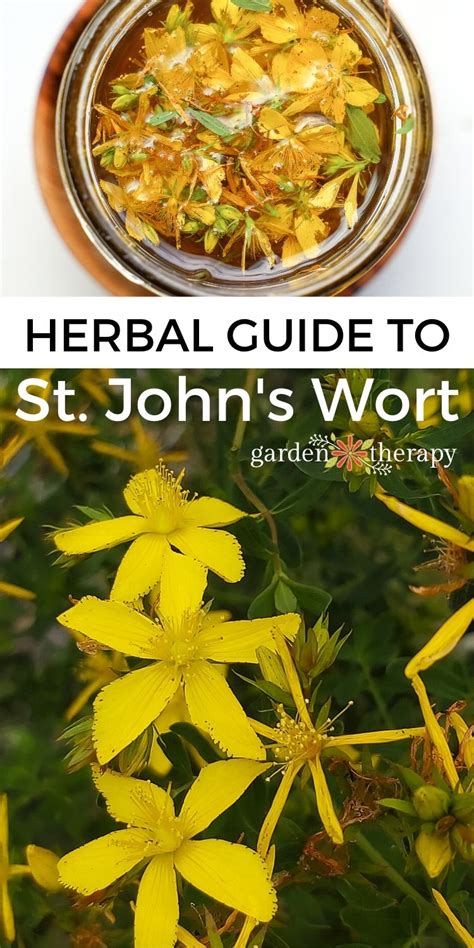Intro
The importance of mental health has become increasingly recognized in recent years, and with it, the search for effective treatments for conditions such as depression and anxiety. One herbal remedy that has gained significant attention for its potential benefits in this area is St. John's Wort. This plant, also known as Hypericum perforatum, has been used for centuries in traditional medicine to treat a variety of ailments, including mental health disorders. Its popularity stems from its perceived ability to improve mood, reduce stress, and enhance overall well-being.
St. John's Wort is a flowering plant that is native to Europe, Western Asia, and North Africa. It has been used in traditional medicine for over 2,000 years, with ancient Greeks and Romans utilizing it to treat a range of conditions, including anxiety, insomnia, and depression. The plant contains a number of bioactive compounds, including hyperforin and hypericin, which are believed to contribute to its therapeutic effects. Today, St. John's Wort is available in various forms, including capsules, tablets, and teas, and is widely used as a dietary supplement.
The potential benefits of St. John's Wort have been the subject of extensive research, with numerous studies investigating its efficacy in treating mental health disorders. While the evidence is not yet conclusive, many studies suggest that St. John's Wort may be effective in reducing symptoms of mild to moderate depression, as well as anxiety and stress. Additionally, the plant has been shown to have anti-inflammatory and antioxidant properties, which may contribute to its overall health benefits. With its long history of use and potential therapeutic effects, it is little wonder that St. John's Wort has become a popular natural remedy for those seeking to improve their mental health and well-being.
What is St. John's Wort?

History of St. John's Wort
The use of St. John's Wort dates back to ancient times, with the plant being used in traditional medicine for over 2,000 years. The Greek physician Hippocrates (460-370 BCE) is believed to have used the plant to treat a range of conditions, including anxiety and depression. The plant was also used by the Romans, who valued its medicinal properties and used it to treat wounds, insomnia, and digestive problems.Benefits of St. John's Wort

How St. John's Wort Works
The exact mechanisms by which St. John's Wort exerts its therapeutic effects are not yet fully understood, but it is believed that the plant's bioactive compounds, particularly hyperforin and hypericin, play a key role. These compounds have been shown to: * Inhibit the reuptake of neurotransmitters, such as serotonin and dopamine, which are involved in mood regulation. * Reduce inflammation and oxidative stress, which may contribute to the development of mental health disorders. * Interact with the body's natural opioid system, producing a sense of relaxation and well-being.Using St. John's Wort

Precautions and Side Effects
While St. John's Wort is generally considered safe, it can interact with certain medications and may cause side effects in some individuals. Potential side effects include: * Gastrointestinal upset * Dizziness and headaches * Increased risk of serotonin syndrome when taken with other serotonergic medications * Interactions with certain medications, including blood thinners, diabetes medications, and anti-depressantsSt. John's Wort and Mental Health

St. John's Wort and Depression
St. John's Wort has been shown to be effective in reducing symptoms of mild to moderate depression, with some studies suggesting that it may be as effective as conventional anti-depressant medications. The plant's bioactive compounds, particularly hyperforin and hypericin, are believed to contribute to its anti-depressant effects.Conclusion and Future Directions

Final Thoughts
As we move forward, it is essential to consider the potential benefits and risks of using St. John's Wort as a treatment for mental health disorders. While the plant may offer a natural and effective alternative to conventional medications, it is crucial to consult with a healthcare professional before using it, particularly if you are taking other medications or have a medical condition.What is St. John's Wort used for?
+St. John's Wort is used to treat a range of conditions, including depression, anxiety, insomnia, and digestive problems.
How does St. John's Wort work?
+The exact mechanisms by which St. John's Wort exerts its therapeutic effects are not yet fully understood, but it is believed that the plant's bioactive compounds, particularly hyperforin and hypericin, play a key role.
Is St. John's Wort safe to use?
+While St. John's Wort is generally considered safe, it can interact with certain medications and may cause side effects in some individuals. It is essential to consult with a healthcare professional before using St. John's Wort, particularly if you are taking other medications or have a medical condition.
We hope this article has provided you with a comprehensive overview of St. John's Wort and its potential benefits for mental health. If you have any questions or comments, please don't hesitate to reach out. Share this article with friends and family who may be interested in learning more about this herbal remedy, and consider consulting with a healthcare professional to determine if St. John's Wort may be right for you.
